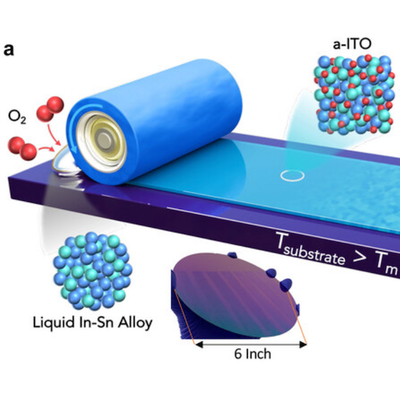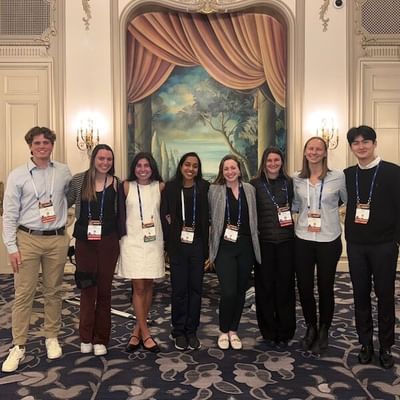- Undergraduate
Bachelor's Degrees
Bachelor of ArtsBachelor of EngineeringDual-Degree ProgramUndergraduate AdmissionsUndergraduate Experience
- Graduate
Graduate Experience
- Research
- Entrepreneurship
- Community
- About
-
Search
Research Quick Takes

Aug 07, 2025
IEEE Power & Energy Society Award
Professor Junbo Zhao received a 2025 IEEE PES Technical Committee Prize Paper Award for "State Estimation for Integrated Energy Systems: Motivations, Advances, and Future Work" published in IEEE Transactions on Power Systems.

Aug 07, 2025
High-Performance Flexible Oxide Electronics
Research Associate Le Minh Nhut, Saifur Rahman Th'25, PhD students Simon Agnew '22 and Sam Ong, and Professor Will Scheideler coauthored a paper published in Advanced Functional Materials on flexible amorphous metal oxide transistors incorporating graded 2D homojunctions. These ultrathin materials could be used for high-performance wearable displays for virtual and augmented reality.

Jul 24, 2025
Novel Complex Impedance Imaging Methods
PhD students Allaire Doussan and Sophie Lloyd, and Professors Ethan Murphy and Ryan Halter are coauthors of "Comparison of Complex Open Domain Electrical Impedance Tomography (EIT) Methods" published in IEEE Transactions on Biomedical Engineering. The paper focuses on complex EIT methods and introduces a novel method for handling inversions in permittivity reconstructions.

Jul 10, 2025
Foundational Science Award
Professor Katie Hixon received Geisel's Special Recognition in Foundational Science Award. Honorees were selected by the Research Excellence Awards Committee for their outstanding scholarly contributions.

Jul 10, 2025
Vulnerability of Complex Systems
Professor Peter Chin received a three-year, $1M award from DoD to work on the DARPA INGOTS program. He plans to use AI to better understand the vulnerability of a complex modern digital system (e.g. mobile phones) and develop new theories and tools for vulnerability research on these systems.

Jun 19, 2025
More Accurate Ice Sheet Models
Professor Hélène Seroussi is senior author of "Increased sea-level contribution from northwestern Greenland for models that reproduce observations" published in PNAS. The study uses observational data and time-dependent physics to inform an ice flow model of northwestern Greenland glaciers. The model better matches historical observations and shows that future sea-level rise contribution from this region may be significantly larger than projected over the coming century. The paper also suggests a path forward for making the method scalable to the entire Greenland Ice Sheet.

Jun 12, 2025
Research Prize: Metamaterials
PhD student Xiangbei Liu received third prize in the 2025 Neukom Outstanding Graduate Research Awards. Her research with Yan Li’s Group uses machine learning to efficiently design metamaterials with zero Poisson's ratio that maintain their shape in the transverse direction when stretched or compressed, making them ideal for soft robotics and biomedical devices.

Jun 05, 2025
Improving Healthcare Access
Professor Vikrant Vaze is a co-author of "A novel outreach approach for identification of familial hypercholesterolemia: Interview-based formative evaluation to improve healthcare access and quality" published in PEC Innovation. "This was a collaborative effort with folks from DH and Geisel, as well as Family Heart Foundation. The study is aimed at designing and evaluating direct outreach and referral to specialty care for patients with an elevated risk of FH identified through a machine learning model and expert review of the electronic record in a rural US health system. It's an excellent human-centered design thinking exercise and it yielded a great deal of success," said Vaze.

May 22, 2025
Cyber Defense x2
Professor Peter Chin's Learning, Intelligence + Singal Processing (LISP) lab had two papers accepted at the Reinforcement Learning Conference (RLC): "Hierarchical Multi-agent Reinforcement Learning for Cyber Network Defense" and "Quantitative Resilience Modeling for Autonomous Cyber Defense." Said Chin, "Both papers are part of the outcome of the four-year DARPA research project called CASTLE: Cyber Agents for Security Testing and Learning Environments that LISP lab has been working on to develop game-theoretic reinforcement learning agents that can outsmart potential cyber adversaries in an enterprise-level network."

May 22, 2025
Most Read of All Time
Professor Vikrant Vaze is a co-author of “Operational Research: methods and applications” which recently became the most read article of all time in the Journal of the Operational Research Society—the oldest journal in the field of operations research. "This is arguably the first prominent article to provide a comprehensive overview of the state-of-the-art in operations research [OR], from both a methodological and from an applications standpoint. It is meant to serve as the first point of reference for OR academics, researchers, students and practitioners alike," said Vaze.

May 01, 2025
Understanding AI Behavior
PhD students Clement Nyanhongo '17 Th'18 and Bruno Miranda Henrique, and Professor Gene Santos co-authored "Reward Distance Comparisons Under Transition Sparsity" published in Transactions on Machine Learning Research. "Traditional reward comparison methods rely on behavioral simulations, which can be costly and pose safety risks. Our method is specifically designed to operate in more realistic and practical settings, recognizing real-world constraints, and outperforms existing approaches across a range of domains," says Santos.

Apr 24, 2025
Tissue Engineering on Display
The Hixon Lab had a strong showing at the Society for Biomaterials 50th Annual Meeting & Exposition in Chicago earlier this month. PhD student Amritha Anup Th'23, MS-MD student Jewelia Durant, Jack Flaggert '26, Daniel Kang '25, Kristine Suritis '25, and Kate Wasacz '25all presented posters showcasing their work, and Emma Kerimo '25 was invited to deliver an oral presentation.
